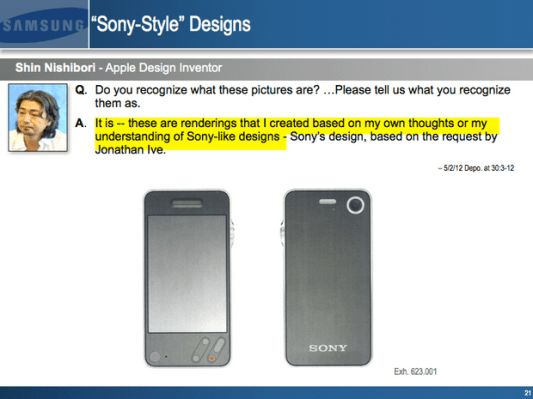Samsung and Apple’s big patent trial took an intriguing turn earlier this week when members of Samsung’s legal team decided to send information that was unusable in court to a handful of eager reporters.
Of course, Apple wasn’t about to take that lying down. Apple attorney William F. Lee recently filed a motion that asked for the Korean electronics giant to be sanctioned (again). This time though, instead of monetary damages or a procedural edge in court, Lee’s newly requested sanction calls for the case to be dismissed and for Judge Lucy Koh to find in Apple’s favor.
In Lee’s own words:
“…Apple respectfully requests that the Count sanction Samsung by granting judgment in favor of Apple on its claim that Samsung infringes Apple’s phone design patents, and granted judgment that those patents are not invalid.”
Suffice it to say that’s probably not going to happen, so Lee offered up some alternative (more reasonable) penalties to be inflicted upon Samsung just in case he didn’t get lucky the first time. At the very least, Lee contends, the jury should be told the court has found that Samsung indeed copied the Apple designs in question because the company’s actions were out of line. What’s more, Lee asks that Samsung be disallowed from pointing to designer Shin Nishibori’s Sony phone designs from here on out.
In case you haven’t been keeping up with the case, here’s what Samsung did to prompt this kerfuffle. On the afternoon of the 31st, the Korean company’s legal counsel sent to members of the press a PowerPoint presentation that Judge Lucy Koh had previously deemed inadmissible. Exactly how damning that evidence is remains open to interpretation — the PowerPoint slides in question include some dialogue from Apple designer Shin Nishibori (who created the now well-known Sony iPhone designs) and phone designs the company was working on prior to the iPhone’s launch in 2007 — but Judge Koh was none-too-pleased with that turn of events.
John Quinn, Samsung’s lead counsel for this case, eventually admitted in writing that he had authorized the release of the materials. It was a gutsy move on his part but not an impulsive or poorly-conceived one, as Groklaw artfully points out.
Naturally, Apple didn’t take too kindly to Samsung’s maneuver, and here we are. The jury has been instructed to avoid related media coverage for the duration of the trial so their verdict ideally shouldn’t be influenced by the released information anyway, but that clearly wasn’t enough for Apple’s legal team. Whether or not this (damned ambitious) request goes anywhere is still unclear, but the trial is set to resume tomorrow so it shouldn’t be long at all before we find out if this whole thing ends before it really gets started.
